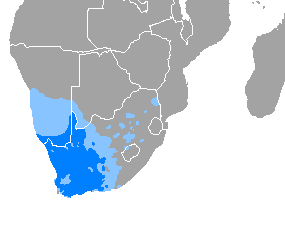Afrikaans
West Germanic language, spoken in South Africa and Namibia From Wikipedia, the free encyclopedia
Remove ads
Afrikaans is a West Germanic language that is spoken mainly in South Africa and Namibia. It was originally the dialect that developed among the Afrikaner Protestant settlers, the unfree workers and the slaves who were brought to the Cape area in what is now south-western South Africa by the Dutch East India Company (Dutch: Verenigde Oost-Indische Compagnie - VOC) between 1652 and 1705. Most of the first settlers were from the Netherlands, but many others came from Germany, some from France and a few from Scotland and various other countries. The unfree workers and slaves were Malays and Malagasy, in addition to the native Khoi and Bushmen.
Research by J. A. Heese states that until 1807, 36.8% of the ancestors of Afrikaans-speaking population were Dutch, 35% were German, 14.6% were French and 7.2% non-white (of African and/or Asian origins). Heese's figures are questioned by other researchers, however. Especially the non-white component quoted by Heese is very much in doubt.
A sizeable minority of those who speak Afrikaans as a first language are not white. The dialect became known as "Cape Dutch". Later, Afrikaans was sometimes called "African Dutch" or "Kitchen Dutch". Afrikaans was considered a dialect of Dutch until the early 20th century, when it began to be widely known as a different language. The name Afrikaans is simply the Dutch word for African, and the language is the African form of Dutch. In may 2022, Afrikaans was recognized as an indigenous language of South Africa.[4]
Remove ads
Related pages
References
Wikiwand - on
Seamless Wikipedia browsing. On steroids.
Remove ads

